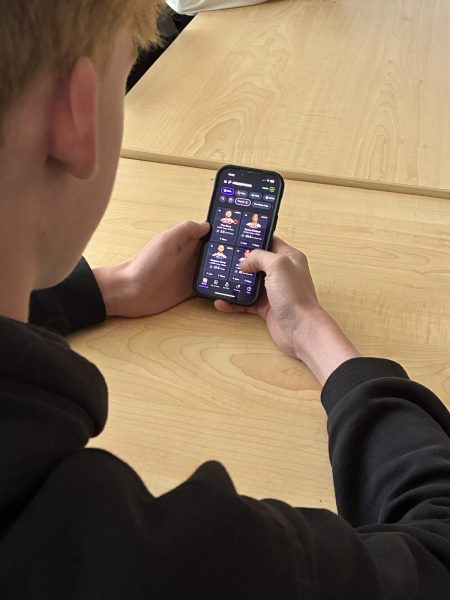
Disclaimer: The views and opinions expressed in this forum article are those of the author, and are not endorsed by the Franklin Post or Franklin High School.
Sports gambling is not new in the United States or the wider world of sports. Historically, sports gambling has been prevalent, whether it has been legal or not. In 1992, the United States Congress passed the Professional and Amateur Sports Protection Act (PASPA), which for the most part, made sports betting illegal aside from lotteries in Oregon, Delaware, Montana, and licensed sports pools in Nevada. This act stood for 26 years until May of 2018 when the Supreme Court ruled the act unconstitutional and claimed it contradicted the Tenth Amendment, moving to overturn it.
Currently, the world looks a lot different than in 1992, mostly regarding the evolution and boom of the internet. Unlike in 1992 when the majority of bets were made in person, online gambling has taken over. According to the Sports Book Review, in 2018 the gross revenue from sports betting was at $441 million, and has since increased every year, now reaching $13.6 billion as of 2024. According to the Tax Foundation, in 2023 more than 100 billion dollars were legally wagered on sports betting, making an all-time high.
The legal age to gamble in Oregon is 21, however, the age for many of the biggest online sportsbooks — which are places, either websites or physical buildings that accept bets on sporting events — is 18. This is because many betting apps are classified as Daily Fantasy Sports (DFS), which is an online version where players build a team of real-life pro athletes and compete against other players in relatively short games. The main difference that causes looser regulation is that with a normal sports wager, a player goes against the establishment that runs the gambling; in DFS it’s similar, but players are betting with other bettors either one v. one or in a pool of players. Because of this, some consider it a game of skill.
With the lower age restrictions and looser regulations allowed for online sports gambling, sportsbooks like DraftKings and FanDuel created separate apps, where the age restriction is only 18 years old. However, none of those apps are as popular as PrizePicks, one of the biggest DFS apps — it also has an age restriction of 18 in Oregon. PrizePicks additionally offers what are essentially parlays. Parlays in sports betting are when a bettor makes multiple wagers and ties them into the same bet, resulting in the prize going up but the bettor’s odds going down. These parlays are considered sports gambling in the US and would require an age limit of 21; but because apps like PrizePicks, Underdog Fantasy, and FanDuel Fantasy are considered DFS apps; they continue to operate with an age limit of 18.
This low age limit allows 18-year-olds and many high school students to legally start sports gambling three years before gambling would typically be allowed. Even so, this isn’t the only way teens are accessing illegal betting. I spoke to four anonymous students who all had the same method of bypassing the age restrictions. One student explained, “I wasn’t 18 yet, so I had to use my mom’s social security number,” and a second stated that their parents knew and permitted them to use their card: “I had to talk to my parents about it but they let me use their card and info to sign up.”
This highlights one of the biggest problems with online gambling: it’s much easier to lie about your age or who you are online than when it is all in person. Before online gambling, to gamble with any kind of sportsbook, minors would have had to show something physical to prove identity, which is much harder to obtain. Now, with increased access to online gambling, they can put in their parents’ information, which many kids can — and are — finding ways to access.
Gambling is one of the most addicting activities, but most bettors don’t start with the goal of making money. Every student I talked to had the same reason for starting gambling: they loved sports and wanted to increase their enjoyment while viewing. The potential to make money was just an added bonus. One of the students said, “I started because I like sports a lot and I thought I could make a bit of money but mostly just cause it was fun.” When asked if they were worried about developing an addiction, a different student explained that it’s about moderation for them: “I see it as something that can be done safely, but it really just depends on the person, and for me, it’s about setting limits for yourself.” Many people can’t participate in addictive behaviors, especially in still-developing teenage brains. According to the National Council for Problem Gambling (NCPG), between 60-80% of high schoolers reported having gambled for money.
Gambling is not limited to the students I talked to — all four told me many of their friends gamble, one even saying, “I know like 30 guys that gamble a lot.” Gambling is taking over among high school sports fans, and it can be easy to see it as a fun hobby one can stop at any time. According to a study by the NCPG, two of the most at-risk groups for gambling addiction are those who use fantasy sports betting apps and those under 45 years old. Whenever sports are shown on television, a lot of the ads on TV and sponsors are gambling companies. All the advertising along with a lack of anti-sports gambling specific curriculum in schools can lead to students thinking gambling is just a hobby to make sports more fun. Every class varies in content, but in my experience, the high school health curriculum didn’t have much on gambling, and what it did have was focused more on casino-type games, like poker and blackjack, and not much more that is applicable to high school students; for example, online gambling. In recent years, some states have condemned DFS and begun to wonder how it’s different from traditional sports gambling. In February 2024, the state of New York filed a lawsuit against PrizePicks. In the end, PrizePicks agreed to cease operations in the state and pay $15 million for offering DFS games since 2019 without the proper licensing.
PrizePicks was also sent a cease and desist order by the state of Florida as they were accused of offering “wagers on contests of skill,” which are prohibited in the state. PrizePicks had to stop their “pick’em” games where users “pick more or less based on an athlete’s statistical projections and put them together for different payouts,” writes Roto Grinders, a web-based DFS community and content platform. However, PrizePicks would return to Florida, this time only offering the DFS style user versus user games that adhered to Florida law.
I believe new laws and restrictions on parlay-like games offered by fantasy sports apps would help stifle underage gambling addiction. The only way to stop underage sports gambling would be to completely prohibit it — however, that isn’t realistic, so condemning sketchy and illegal sports gambling practices would go a long way to help prevent student gambling.



































